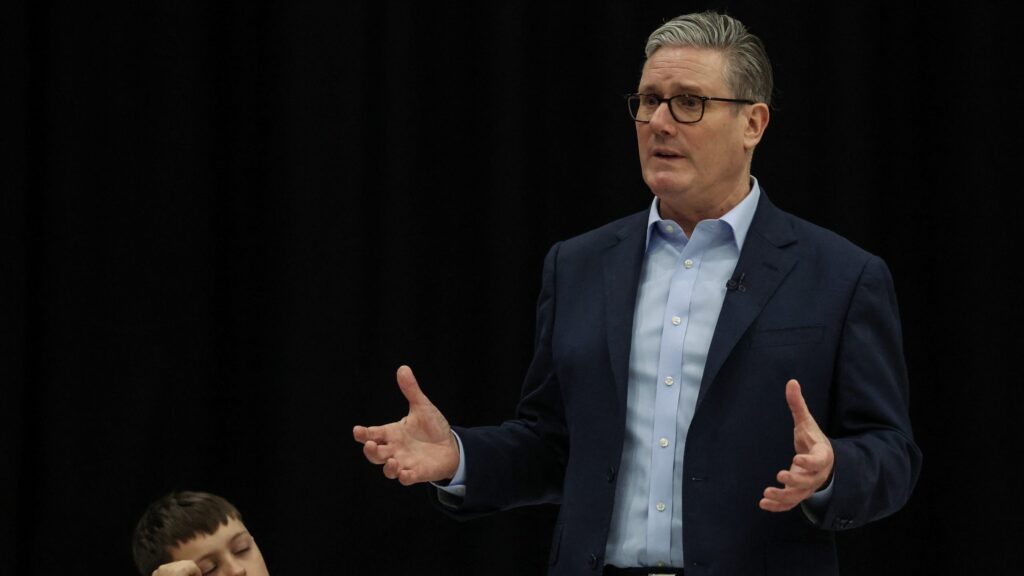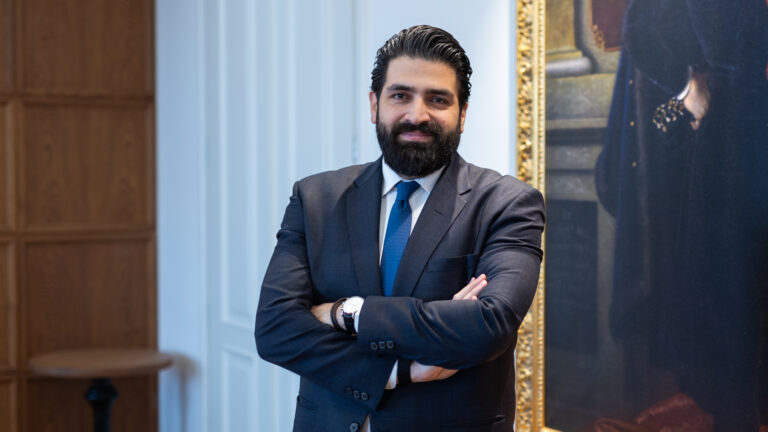Dr George Weinberg is a seasoned executive with extensive experience in real estate, finance, and cross-border investment between the United States and Germany. After early roles in construction and development at Atlantic Realty Corporation in New Jersey, he returned to Germany as a board member of a publicly listed company and later became managing director of Berliner Bank Real Estate. In 1998, he founded Tomorrow Fund Management Germany/USA, leading operations in both countries until 2004. He currently serves as Executive President and Partner at Grundwert USA/Polska and is Chairman of Republicans Overseas Germany. He is also a regular guest in German legacy media, including appearances on WELT and German public broadcasters. Most recently, he was invited as a speaker at CPAC Poland.
***
Dr Weinberg, you’ve spent significant parts of your life in both the United States and Germany. What strikes you as the core difference between American and German conservatism?
In the United States, conservatism is rooted in the idea of individual responsibility and personal liberty. The Constitution serves as a foundational document, shaping a mindset in which each man is regarded as the architect of his own destiny. This approach fosters a culture of risk-taking and self-reliance, where the government’s primary role is to protect freedoms rather than to direct personal or economic choices.
In contrast, German conservatism has historically emphasized collective identity and social order. Its origins lie in traditions that value hierarchy, continuity, and the community over the individual. Even as German conservatism has evolved to embrace democratic principles, there remains a strong sense of duty to the group and a respect for established structures. The state is often viewed as a stabilizing force, and changes are typically approached with caution to ensure social cohesion is not disrupted.
‘In the United States, conservatism is rooted in the idea of individual responsibility and personal liberty’
Intellectually, American conservatism tends to be pragmatic, focusing on preserving what has proven effective—such as free markets and the rule of law—rather than adhering to abstract theories. The tradition is one of practicality, where results matter more than ideology. German conservatism, on the other hand, is characterized by a rich philosophical tradition. Thinkers have long grappled with questions of national identity, history, and the challenge of maintaining core values in a rapidly changing world. This has sometimes led to innovative or even radical approaches to preserving what is considered essential.
Regarding modernity and progress, Americans generally welcome innovation, provided it does not undermine individual freedoms or established principles. Germans, meanwhile, often see technological and social advancements as means to serve the collective good, as long as they do not threaten the underlying sense of community and order.
Ultimately, the distinction lies in the balance between individual and collective priorities. American conservatism places the individual at the centre, with an emphasis on freedom and scepticism toward government intervention. German conservatism, by contrast, remains more attuned to the needs of the community, valuing stability and continuity.
Could you share a moment when this difference became particularly vivid for you?
If I am honest, the difference between American and German conservatism has rarely been so clear to me as right now, in the midst of Trump’s second term as president. Just recently, I found myself surrounded by German conservatives—men who see themselves as defenders of tradition and order. The conversation drifted, inevitably, to US politics. The moment Trump’s name came up, the mood shifted: there was a visible discomfort, almost a reflexive recoil. For them, Trump is not just a controversial figure; he is practically an affront to their idea of what a conservative should be.
They simply cannot comprehend how so many Americans—especially conservatives—can support a man who speaks so bluntly, who relishes confrontation, and who seems to break every rule of decorum. The way he talks, the way he acts, even the fact that he is now serving as the 47th president, is to them almost unthinkable. Some even described their reaction as bordering on disgust, not just disagreement.
From my perspective, though, that is exactly the point. In America, especially among conservatives, there is an appetite for leaders who shake things up, who refuse to play by the old rules, and who put the interests of their countrymen first—no matter how much it ruffles feathers at home or abroad. We are not looking for someone to win a politeness contest; we want someone who gets results and is not afraid to take on the so-called establishment.
‘In the US…we are often more pragmatic: if a man delivers, we are willing to overlook a few rough edges’
What struck me most was how much the German reaction echoed the tone you hear from public broadcasters—serious, almost moralizing, and deeply invested in the idea that politics should be dignified above all else. In the US, on the other hand, we are often more pragmatic: if a man delivers, we are willing to overlook a few rough edges. That is a difference you can feel in every conversation, every headline, and every election result.
So, if you want to see the Atlantic divide in action, just bring up President Trump at a table full of German conservatives in July 2025. The looks you will get say more than a thousand words—and if you listen closely, you might even hear a lecture on why real conservatives could never support such a man. I usually just smile and ask if they have ever watched American football. Some things, it seems, just do not translate.
What misconceptions do Americans and Germans typically have about each other’s conservatism?
Take the classic American view of German conservatism. Many of my friends back home imagine that a German conservative must be a kind of European cousin: pro-business, sceptical of government, and tough on social issues. But then they visit, and the first time they hear a German conservative defending universal healthcare or praising strong labour unions, you can see the confusion on their faces—like someone watching American football for the first time and wondering why the clock keeps stopping. It is a game, but the rules are completely different.
On the other side, Germans often look at American conservatism and see a monolithic, almost caricatured force—rigid, reactionary, and obsessed with individualism at all costs. I have lost count of how many times I have had to explain that there is more to the American right than just populist slogans or cable news soundbites. There are libertarians, moderates, pragmatists, and, yes, even a few who still believe in compromise. But for many Germans, the idea that a conservative could be both pro-market and sceptical of social safety nets is as foreign as the concept of a barbecue party without beer and bratwurst.
What really stands out is how each side projects its own expectations onto the other. Americans expect German conservatives to be their ideological twins, only with a different accent. Germans, meanwhile, see American conservatism through the lens of their own history, wary of anything that smacks of nationalism or too much faith in the free market. It is as if we are all watching the same match, but rooting for different teams and arguing about the rules.
How exactly does Republicans Overseas Germany bridge these cultural and political divides?
Within Republicans Overseas Germany, we see our role as explaining not just the diversity of conservative viewpoints in the United States, but also the reasoning behind them. There is a tendency in German media and public discourse to paint American conservatism, especially support for figures like Donald Trump or the current administration, in broad, often negative strokes. Our task is to show that there are legitimate, fact-based reasons why many Americans stand behind these leaders and policies—reasons that go far beyond the headlines or the usual commentary.
A recent example comes to mind: the passage of the ‘One Big Beautiful Bill’. In the United States, this was a watershed moment, a display of cooperation and legislative discipline. It was a significant achievement for both Speaker Johnson and the Senate Majority Leader Thune, demonstrating that Republicans can act with unity and resolve when it truly matters. Yet in Germany, the event barely registered outside of the usual critical remarks. The scale of this accomplishment, the discipline required to secure a majority, and the political implications were almost entirely overlooked.
Our approach is to bring these facts to the forefront, to counter stereotypes with data and context, and to invite German audiences to see American conservatism in its full complexity. This means not shying away from challenging prevailing narratives, especially when they omit key details or present a one-sided view. It also means engaging in open discussions, sharing personal experiences, and highlighting moments of real political achievement that often go unrecognized abroad.
‘The goal is not to convince everyone to agree with the American perspective, but to ensure that the conversation is grounded in reality, not caricature’
Ultimately, the goal is not to convince everyone to agree with the American perspective, but to ensure that the conversation is grounded in reality, not caricature. By focusing on facts, fostering honest dialogue, and emphasizing the results that matter, we work to build a bridge of understanding—one that respects the differences between our political cultures while making room for a more nuanced exchange.
What are the biggest challenges facing German conservatives today?
German conservatives, particularly those aligned with the Christian Democratic Union and Christian Social Union (CDU/CSU)—collectively referred to as the Christian Democrats—find themselves in a political dead end that is proving exceptionally difficult to resolve. At the heart of the issue lies the coalition landscape: as the established conservative force, the Christian Democrats are effectively limited to forming coalitions with parties to their left. This structural reality means that, even with a strong and well-developed conservative programme, the Christian Democrats are rarely in a position to implement their agenda in full. Every potential government must be brokered with partners who pull policy toward the left, diluting core conservative priorities before they ever reach the legislative stage.
Compounding this challenge is the situation on the right flank. Alternative for Germany (AfD), which in theory could serve as a coalition partner, is not a viable option—both because of the self-imposed ‘firewall’ (Brandmauer), and because the AfD itself is plagued by significant issues. The party is widely seen as unprofessional, organizationally deficient, and, in parts, openly extremist. Recent controversies, such as the AfD’s erratic and, at times, deeply troubling positions on issues like Iran and China, have further underscored the lack of a reliable moral and political compass within the party. This makes any form of cooperation not only politically toxic but substantively impossible for conservatives who value stability and responsible governance.
The result is a scenario where, even if the CDU/CSU emerges as the strongest party, it lacks the necessary majorities to enact a comprehensive conservative programme. The party is forced into compromises that leave its core electorate dissatisfied and its policy ambitions perpetually curtailed.
There is no easy solution or quick fix in sight. The current constellation of parties and the persistent deficiencies within the AfD mean that German conservatives are likely to remain stuck in this impasse for the foreseeable future. The political system offers few avenues for breaking out of this deadlock, and the broader electorate shows little appetite for radical realignment. For now, German conservatives must navigate a landscape where their ability to shape policy is fundamentally constrained by the limits of coalition politics and the lack of a credible partner on the right.
And American conservatives, especially after the 2024 election?
The greatest challenge for American conservatives is holding together the remarkably diverse coalition that made Trump’s re-election possible. The Republican camp is now a patchwork of distinct factions, each with its own priorities and worldview—a reality that presents both opportunity and risk.
At the heart of this coalition is a group I would describe as national conservatives, represented by figures like JD Vance. This wing draws its strength from a newly energized base of working-class Americans, particularly those in manufacturing and industrial sectors who were previously outside the Republican fold. Their focus is on economic renewal, scepticism toward foreign interventions, and a brand of conservatism that puts American workers and interests first.
On the other side stands a more globalist-oriented faction—those traditionally referred to as ‘neo’ conservatives—who continue to see the United States as a global leader and defender of the free world. This group includes prominent voices in the media, such as Fox News, and politicians like Lindsey Graham. They advocate for an assertive foreign policy and a strong international presence, often clashing with the non-interventionist instincts of the new MAGA base.
‘If Republicans can manage to bridge these divides…they stand a real chance of shaping a durable centre-right mainstream in America for years, perhaps decades, to come’
Complicating matters further is the tech-savvy, libertarian-leaning segment of the party. The recent split with Elon Musk, who launched the America Party—a move I view as a stillborn project—has highlighted the risk of losing this innovative and influential group. The rift between Trump and Musk has not only fractured the tech-libertarian alliance but has also sown confusion and division within the broader conservative movement.
Absolutely. That tension has been especially apparent in recent discussions—take, for example, Joe Rogan’s conversation with Bernie Sanders on the Joe Rogan Experience #2341. Rogan was strikingly candid about his disappointment with the administration’s approach, particularly regarding the interventions and preemptive strikes against Iran, which he described as a clear breach of campaign promises.
I have written about this myself, arguing that Trump’s actions were, in fact, strategically sound. Still, when influential voices like Rogan express discomfort or outright alienation, it is a warning sign.
Exactly. The central task now is to restore unity across this coalition, especially with the midterm elections on the horizon. If Republicans can manage to bridge these divides—balancing the priorities of national conservatives, interventionists, and libertarians—they stand a real chance of shaping a durable centre-right mainstream in America for years, perhaps decades, to come.
It is a delicate balancing act, but the stakes could not be higher. The future of American conservatism depends on forging common ground, delivering results, and proving that this coalition can govern effectively in a deeply polarized nation.
What final advice would you give to European conservatives trying to understand American conservatism, and vice versa?
If I have learned anything from a life spent between America and Europe, it is that real understanding only begins when you step outside your own echo chamber. So, to young European conservatives looking across the Atlantic, my advice is simple: do not let headlines or stereotypes do your thinking for you. American conservatism is a living, breathing coalition—sometimes messy, often contradictory, but always in motion. What you see on the surface is just that: the surface. To grasp the real dynamics, you must engage with the full spectrum of ideas, arguments, and personalities that make up the American right.
And for Americans trying to make sense of their European counterparts: do not assume that a shared label means shared priorities. Take the time to understand the historical and cultural context that shapes European conservatism. Recognize that what counts as conservative in Berlin or Budapest may look very different from what you know at home. There is much to learn from Europe’s tradition of balancing reform with preservation, and from its caution about the dangers of unchecked power—whether from the state or the market.
Ultimately, living and thinking between two worlds means embracing complexity. Whether you are looking west or east, the real work is in the dialogue—in listening, questioning, and being willing to see the world through someone else’s eyes. If you do that, you will not just find lessons, but partners. And maybe, together, you will help shape a conservatism that is fit for the challenges of a new era, on both sides of the Atlantic.
Related articles:







